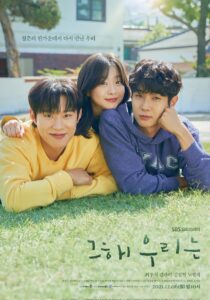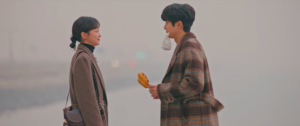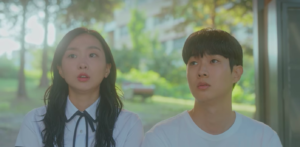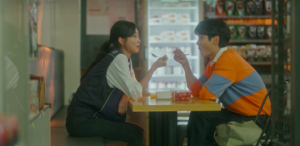
Everything that happens in Our Beloved Summer is something you’ve already seen before. Enemies turn into lovers and charming sidekicks get together. Jealousies spring and hijinks ensue. Childhood trauma explains the characters’ demeanors, while a will-they-or-won’t-they tension moves the story forward.
It ticks off nearly every box in the rom-com checklist, and yet, impressively, Our Beloved Summer still manages to feel fresh.
The drama is all about the mundane aspects of life and love, and because it doesn’t pretend to be anything else (no overacting, no melodrama, no extra genres crammed in), it works. The script is light and funny, without sacrificing substance. The subplots and side characters are minimal, never distracting from the core story and leads.
But among its many strengths, the main thing that keeps Our Beloved Summer afloat is chemistry: Choi Woo-shik and Kim Da-mi are incredibly believable and likable as two lovers figuring out their relationship in a span of ten years. They win you immediately with their easy rapport and relatable quirks so that even though it’s obvious how things will turn out, you root for them anyway.
Sure, the drama is not perfect. It’s not immune to the K-drama tendency of leaving more than a few questions unanswered. And among the already numbered side characters, some are less fleshed out than others. But Our Beloved Summer is just too sweet to hold a grudge against. It is proof that formula isn’t always a bad thing; as long as it’s executed well, everything should be perfectly fine.
NB: The remaining review contains spoilers.
If you’ve been following Woo-shik and Da-mi’s work for a while now, you’ll know that they tend to play eccentric, larger-than-life characters. Woo-shik, in his words, has historically opted for “roles that either kill someone or get killed, or that run away from something and struggle to survive,” while Da-mi’s only other drama credit, Itaewon Class, has her playing a self-proclaimed sociopath—a far, far cry from the typical leading lady. In fact, before Our Beloved Summer, the Woo-shik and Da-mi tandem was best known for its ultraviolence in the supernatural film The Witch: Part 1 – The Subversion; here, they are enemies who beat the hell out of each other.
Woo-shik and Da-mi, then, are the last two actors you’d think to plop into a slice-of-life rom-com. Yet their unexpected turn as the utterly mundane Ung (Woo-shik) and Yeon-su (Da-mi) ends up being a wonderful surprise. They inject a formulaic story with great energy and dynamism, and their kooky streak makes their onscreen relationship all the more believable in its clumsiness and awkwardness. It’s hard to imagine more polished and glamorous actors achieving this level of realism and relatability.

Underrated strengths also come to the surface as we see more of Da-mi’s comedic chops and Woo-shik’s unique leading man qualities. Consider this scene where Da-mi uses her physicality to charge a scene with humor, or this scene where Woo-shik’s romantic gestures have an underlying childishness and mischievousness to them. It bears repeating how perfect these two are for the roles, and how their unexpected charm saves the drama from tired cliches.
That said, there are still plenty of cliches at play here. Our Beloved Summer is not interested in reinventing the wheel, but what it lacks in innovation it makes up for in celebration and self-awareness. It revels in being a rom-com, so much so that almost every episode is titled and structured after a famous romantic film. Sometimes, the drama follows the movie reference to a tee, like when it did flashbacks a la 500 Days Summer, or when it honed in on Ung’s and Yeon-su’s romantic blind spots in a manner that recalled Pride and Prejudice. But other times (arguably the best times), the drama subverts expectations in simple but smart ways.
In an episode titled “Love Actually,” Ji-ung (Kim Sung-cheol) and Yeon-su watch the footage he’s taken of her upon her request. The setup is almost a frame-for-frame remake of the movie it references, and you half-expect things to unfold in the same way, with Yeon-su realizing then confronting Ji-ung about his hidden feelings for her. But surprisingly, the revelation never comes. Love, or its potential, is left up in the air. Later on, Ji-ung’s colleague brings up the Love Actually similarities, but he dismisses it, saying, “I’m not in a movie.”

A similar thing happens much later, in the final episode, when Yeon-su is offered to work in Paris just when Ung invites her to live with him in the same city. It’s the kind of coincidence that only happens in rom-coms, and based on the standard K-drama’s desire to have its cake and eat it too, it seemed obvious that Yeon-su would accept the offer, effectively taking the easy way out of having to choose between work and love. But then she doesn’t take the job, and the drama goes on to show how not choosing your lover at the moment can be an act of love itself. She stays behind, confident that their new love will stand the test of time. “I want to keep exploring the life I have now and keep going,” she tells Ung.
It’s these subtle subversions to familiar tropes that make Our Beloved Summer a refreshing watch. Even though it is far from original in its format, story, and characters (everyone gets a happy ending and no one is seriously hurt), it is fully aware of its purpose and genre and how to move about them. This in itself makes it a step slightly above the rest.
I say slightly because there are still some obvious faults. It doesn’t make sense, for example, that Ji-ung never confesses his love to Yeon-su. It seems to diminish his ultimate decision to play a more active role in his life, and it makes you wonder if his feelings were ever really that serious or if it was just an excuse to keep him relevant in the drama. Ung’s final arc is similarly confusing (his resolve to study architecture and lead a “fuller life” implies that art is inferior and his time as an artist was merely a phase) while the subplot involving NJ (Roh Jeong-eui) was just too bare to be interesting.

Perhaps the drama’s biggest issue, however, is its refusal to let Ung and Yeon-su fight as adults. Instead of love songs just swelling over shots of the couple staring lovingly at each other, the drama would’ve done well to show how specifically they worked out the fractures in their second relationship. After all, the mature thing to do is not to stop fighting altogether, but rather, to fight better, to air out concerns rather than repress them. Showing more fights and resolutions would’ve been the logical thing to do since their first relationship was doomed by a lack of proper communication.
Still, these things are easy to forgive when you have a winning duo serving intimate, dynamic performances and pointed observations each week. What Our Beloved Summer does with the rom-com formula is exciting as well—twisting it just enough to keep things fresh, but never bending it more than it can.
(TheKoreaTimes. YouTube[1][2][3][4][5]. Images via SBS/Netflix.)


